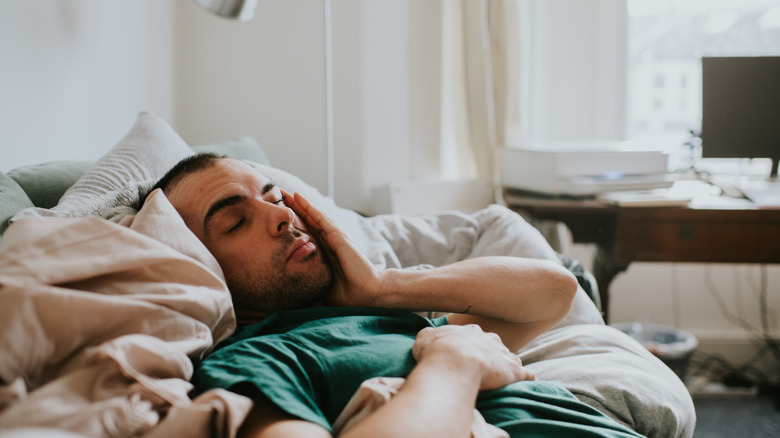Dispelling Some Myths About Hangover Cures
A night of boozy indulgence, no matter how well deserved, can lead to agonizing consequences in the form of a hangover. It's tempting to resort to well-worn chestnuts and folk hangover remedies when your head is pounding like Thor's hammer on an anvil, but there's little scientific evidence to support these supposed cures. For example, Dr. Taylor C. Wallace, CEO of Think Healthy Group LLC and adjunct clinical associate professor at George Washington University, says, "The whole 'beer before liquor makes you sicker' or order of drinks has no effect on hangovers."
Thanks to gritty crime procedurals and raunchy teen comedies, hangover cures like caffeine and cold showers are pillars of the American dramaturgical zeitgeist. But Wallace says they do nothing to influence your drunkenness or the resulting hangover, though caffeine may give you a temporary energy jolt. Unfortunately, it also acts as a diuretic, causing more frequent urination and therefore contributing to the dehydration that leads to hangovers. It could also narrow your blood vessels, worsening your headache. And while a cold shower may alleviate some symptoms of a hangover, it can be dangerous if you're drunk since alcohol influences your body's thermoregulation.
Wallace also nixes 'the hair of the dog' or drinking alcohol after a night of binge drinking to reduce the adverse effects of a hangover. He advises, "It may temporarily minimize some symptoms, but it can also contribute to and prolong the malaise ... and prolong inflammation."
Understanding hangover cure limitations
The headaches, nausea, shakiness, and tiredness you feel when you have a hangover are the result of dehydration, inflammation, gastrointestinal irritation, low blood sugar, and disrupted sleep. Though you can mask some of the symptoms, you can't cure them with caffeine, more alcohol, temperature-controlled baths, or superstitious drink alignment.
The best you can do is eat well before you go out (and for breakfast in the morning), drink at least as much water as you do alcohol, and avoid congeners. Congeners are the product of fermentation and contribute to flavor and aroma. They're present in greater numbers in darker alcohols, and while the amount of alcohol you have determines how bad your hangover will be, congeners break down into toxic chemicals that can make them worse, which is why clear liquor is less likely to give you a hangover.
Unfortunately, that's about as much as we know. As Wallace explains, "Hangover research is extremely limited because it's unethical to assign people to a treatment group that requires excessive alcohol intake." That leads researchers to rely on observational studies, which can lead to distorted associations and reverse causation, which is often how these myths come to be in the first place.

